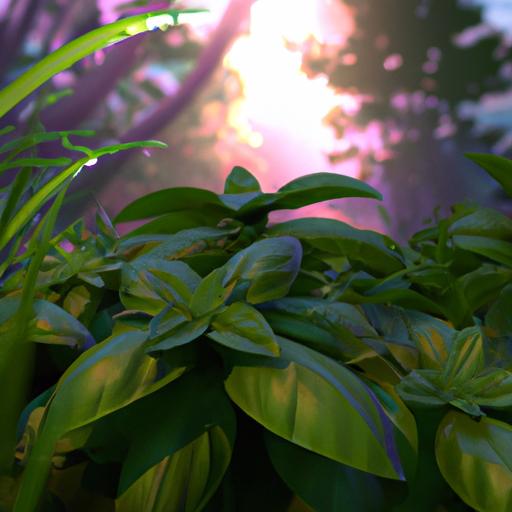Are you growing basil in your garden, but don’t understand why it’s not growing? You’re not alone! Growing basil can be a tricky task, but with the right information and understanding of its needs, you can be successful.
In this article, we’ll delve into the common causes of why your basil isn’t growing, such as poor soil quality, improper watering, and insufficient sunlight.
We’ll also provide helpful tips on how to assess soil quality, watering and sunlight needs, and provide insight on the nutrient requirements basil needs to thrive.
Keep reading to finally get the answers you need to grow a thriving basil plant!
Table of Contents
Short Answer
There could be a few reasons why your basil is not growing.
The soil might not be getting enough nutrients or sunlight, or it might not be getting watered enough.
Additionally, if the temperature is too cold, your plant may not be able to thrive.
Finally, it’s possible that you may have planted the basil incorrectly.
Poor Soil Quality
When it comes to why your basil isn’t growing, poor soil quality can be a major factor. If the soil doesn’t have the right balance of nutrients, your basil will not be able to thrive. To ensure your soil is of good quality, you should check for the following: pH balance, organic matter, and drainage.
The pH balance of soil affects how well plants absorb nutrients from the soil.
The ideal range for basil is 6.0-7.0.
If the pH is too low, your basil will have difficulty taking in nutrients.
To ensure the pH of your soil is in the right range, you can test the soil with a home test kit or have your soil tested at a local agricultural cooperative.
Organic matter is also important for healthy soil.
Organic matter can be added to the soil in the form of compost or other organic material.
This will help to improve the structure of the soil, which will help with drainage and make the soil more nutrient rich.
Finally, drainage is an important factor in soil quality.
Poor drainage can lead to waterlogged soil, which can lead to root rot and other issues.
To ensure proper drainage, you should make sure the soil is not too compacted and that it has plenty of air pockets.
You can also add compost or other organic materials to the soil to help with drainage.
By taking the time to assess the soil quality of your basil, you can ensure it is getting the right balance of nutrients and water to help it grow healthy and strong.
Improper Watering

When it comes to understanding why your basil isnt growing, improper watering is one of the most common causes.
Basil is a delicate herb that needs to be watered regularly, but not too often.
If the soil is kept too wet, the roots can become waterlogged and cause the basil plant to rot.
On the other hand, if the soil is kept too dry, the basil plant will not get enough water to grow properly.
To ensure your basil plant is getting the right amount of water, it is important to check the soil for moisture before watering.
If the soil feels dry, it is time to water the plant.
It is also important to make sure the soil is well drained so that the excess water does not accumulate and cause root rot.
Additionally, ensuring the plant is not over- or under-watered, and providing it with the right amount of nutrients can all help to ensure optimal growth.
Taking the time to understand the needs of your basil plant will help to ensure it grows healthy and strong.
Insufficient Sunlight
One of the main reasons why your basil isn’t growing could be due to insufficient sunlight.
Basil plants need at least 6 hours of direct sunlight each day to thrive and grow.
If your basil is planted in a spot that doesn’t receive enough light, it won’t be able to generate the energy it needs to survive and grow.
To ensure your basil plant is getting enough light, you should move it to a spot that gets direct sunlight for at least 6 hours each day.
You can also supplement natural sunlight with a grow light if needed.
If your basil is getting enough sunlight, it will start to look brighter, more vibrant, and start to grow more quickly.
Assessing Soil Quality

Assessing the soil quality of your basil plant is an important step to take when trying to identify why it is not growing.
Poor soil quality can be caused by a variety of factors, including incorrect pH levels, inadequate drainage, and a lack of essential nutrients.
To assess the soil quality, you can start by conducting a pH test.
The ideal pH level for basil is 6.0-7.0, which you can measure using a soil pH tester or a simple pH test kit.
If the pH level is too low or too high, you can adjust it accordingly by adding lime or sulfur, respectively.
Next, you should check for adequate drainage.
Basil plants prefer well-draining soil, and soil that is too wet or soggy can lead to root rot and other issues.
To test the soil drainage, place a few handfuls of soil in a bucket and add water.
If the water doesnt drain away quickly, you may need to amend the soil with organic matter such as compost or peat moss.
Finally, you should make sure the soil has the necessary nutrients for the plant to thrive.
Basil needs a variety of nutrients, including nitrogen, phosphorous, and potassium.
If the soil is deficient in any of these, you can correct it by adding a fertilizer or soil amendment.
You can also add organic matter such as compost or manure to help enrich the soil.
By following these steps, you can help ensure your basil plant is growing in soil that is well-suited for its needs.
Taking the time to assess the soil quality can be a great first step in troubleshooting why your basil isnt growing.
Watering and Sunlight Needs
Watering and sunlight are two of the most important factors when it comes to ensuring optimal growth for your basil plant.
Overwatering or underwatering can both lead to stunted growth; therefore, its important to assess the soil and determine the right amount of water for your basil plant.
You should also make sure that the soil is well-drained; excess water can lead to root rot, which can also hinder growth.
In addition to assessing the soil and water, its also important to ensure your basil plant is getting enough sunlight.
While basil is known for its ability to grow in partial shade, it will thrive with at least six hours of direct sunlight per day.
If your basil plant is not getting enough light, it may appear stunted and its leaves may start to yellow.
If this is the case, try moving your plant to a spot where it can get more light.
Finally, its important to ensure your basil plant is getting the right amount of nutrients.
While its not necessary to provide your plant with fertilizers, you should make sure its getting the right balance of nutrients.
Compost is a great way to give your basil plant the nutrients it needs to thrive.
Additionally, you can also add a slow-release organic fertilizer to the soil to provide your plant with an extra boost.
Draining the Soil

When it comes to ensuring optimal growth for your basil plant, one of the most important things to do is to make sure the soil is well-drained.
Poor drainage can lead to waterlogged soil, which can prevent your basil from getting the oxygen and nutrients it needs.
To check the soil drainage, simply dig a few inches into the soil and fill it with a few inches of water.
If the water drains away in less than an hour, your soil is well-drained.
If it takes longer than an hour, it may be a sign that it is not draining properly, and you may need to add compost or another soil amendment to help improve the drainage.
Additionally, make sure your pot or planter has drainage holes in the bottom to ensure any excess water can drain away.
Nutrient Requirements
When it comes to growing healthy and strong basil, providing the plant with the right amount of nutrients is essential.
Basil requires a wide range of nutrients to grow and thrive, including nitrogen, phosphorus, and potassium.
Additionally, it needs some trace elements, such as calcium, magnesium, and sulfur.
Nitrogen is important for promoting healthy growth, and is usually provided by compost or manure.
If you’re using a chemical fertilizer, look for one that contains a higher nitrogen content.
Phosphorus is important for root development and flower production, and can be found in bone meal or super phosphate.
Potassium is important for overall plant health, and can be obtained from potassium sulfate or potassium chloride.
Calcium is essential for strong cell walls and can be found in limestone or gypsum.
Magnesium is important for photosynthesis and can be found in Epsom salts or dolomite.
Sulfur is essential for protein production and can be found in sulfate of potash or ammonium sulfate.
Providing your basil plant with the right amount of nutrients is essential for healthy growth and development.
To ensure your basil is getting all the nutrients it needs, consider using a balanced fertilizer or soil amendment.
Additionally, make sure the soil has the right pH level (6.0 to 7.0 is ideal for most plants).
Regular soil testing can help you determine if the soil has the right nutrient balance for your basil plants.
Final Thoughts
Ultimately, having a healthy basil plant starts with understanding its needs.
Taking the time to assess the soil quality, ensure the plant is getting enough water and sunlight, and making sure the soil is well-drained can help to prevent any issues with growth.
Additionally, ensuring the plant is not over- or under-watered, and providing it with the right amount of nutrients can all help to ensure optimal growth.
With these tips in mind, you can be sure that your basil will be healthy and strong for years to come.
Now go forth and grow!

